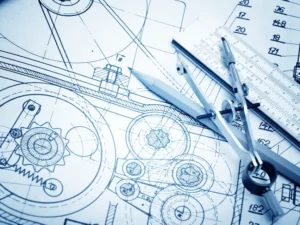- Monday - Saturday 9AM -5PM
Mechanical engineering is a diverse and dynamic field that plays a pivotal role in shaping the world we live in. It encompasses the design, analysis, manufacturing, and maintenance of mechanical systems, ranging from tiny microdevices to massive power plants. As one of the oldest and broadest engineering disciplines, mechanical engineering continues to evolve, pushing the boundaries of innovation and technological advancement.

At its core, mechanical engineering involves the application of principles from physics, mathematics, and material science to solve real-world problems. Engineers in this field design and create machines, devices, and systems that improve efficiency, enhance performance, and contribute to the overall progress of society.
One of the key areas of focus in mechanical engineering is design. Mechanical engineers are responsible for conceiving and developing products that meet specific needs, whether it’s a cutting-edge consumer gadget, a fuel-efficient automobile, or a complex industrial machine. The design process involves considering factors such as functionality, safety, aesthetics, and cost-effectiveness. Computer-aided design (CAD) tools have revolutionized this aspect, enabling engineers to create intricate and precise designs with efficiency and accuracy.
Simulation and analysis are integral components of mechanical engineering, allowing engineers to predict and optimize the performance of their designs. Finite element analysis (FEA) and computational fluid dynamics (CFD) simulations, for example, enable engineers to assess structural integrity, thermal behavior, and fluid flow within a system before it is physically built. This not only saves time and resources but also ensures that products meet or exceed performance expectations.
Manufacturing is another critical aspect of mechanical engineering. Engineers work closely with production teams to develop efficient and cost-effective methods for turning designs into tangible products. With advancements in manufacturing technologies such as 3D printing and CNC machining, the field continues to evolve, offering new possibilities for rapid prototyping and customized production.
Energy is a pressing global concern, and mechanical engineers play a pivotal role in addressing it. From designing renewable energy systems to optimizing the efficiency of traditional power plants, mechanical engineers contribute to the development of sustainable and environmentally friendly solutions. The field also intersects with mechatronics, where mechanical systems merge with electronics and computer control, leading to the creation of smart and automated systems.
As technology advances, so do the challenges and opportunities in mechanical engineering. The rise of the Internet of Things (IoT), artificial intelligence (AI), and robotics has opened new frontiers for innovation. Mechanical engineers are at the forefront of integrating these technologies into various applications, from autonomous vehicles to smart manufacturing processes.
In conclusion, mechanical engineering is a multifaceted discipline that continues to shape the world in profound ways. Its practitioners are problem solvers, innovators, and pioneers, contributing to advancements that improve our daily lives. From the smallest microscale devices to the largest industrial machinery, mechanical engineering plays a crucial role in driving progress and ensuring a sustainable future. As we look ahead, the field will undoubtedly continue to evolve, presenting new challenges and opportunities for the next generation of mechanical engineers.
Mechanical engineering systems offer a wide range of benefits across various industries, contributing to technological advancements, efficiency improvements, and the overall progress of society. Here are some key benefits associated with mechanical engineering systems:
In summary, the benefits of mechanical engineering systems extend far beyond individual applications. They influence the efficiency, safety, and sustainability of various industries, making significant contributions to technological progress and improving the overall quality of life.

There are many variations of passages of Lorem Ipsum available, but the majority have suffered alteration in some form, injected humour, or randomised words which don't look even slightly believablThere are many variations of passages.
Graphic design lorem Ipsum is simply dummy text of the printing and type setting industry. Lorem Ipsum has been the industry's standard dummy text ever since the when an unknown printer took.
Developement lorem Ipsum is simply dummy text of the printing and type has been the industry's standard dummy text ever since the when an unknown printer took a galley of type and scrambled it to make.